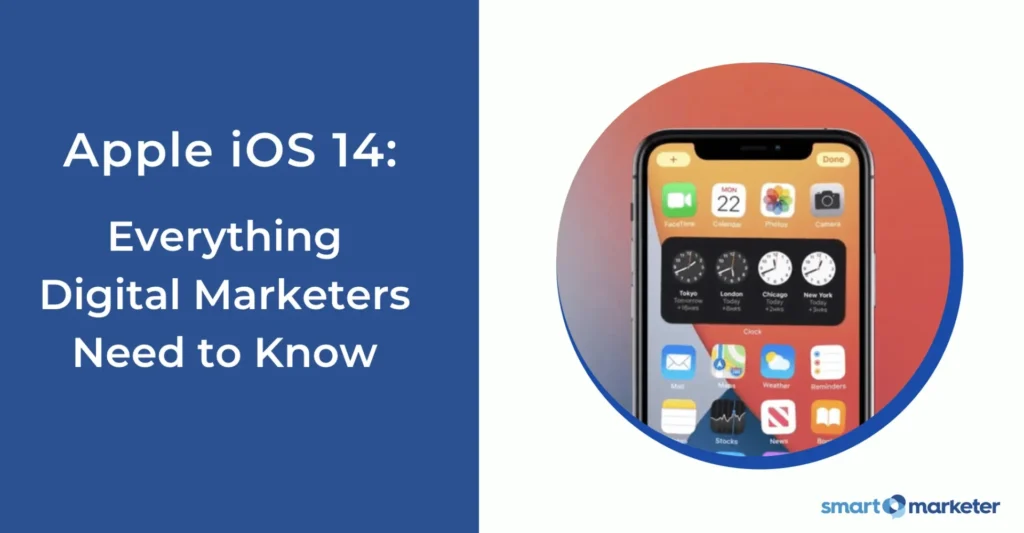Everyone’s worried about Apple’s new iOS 14 and what it means for the future of digital marketing.
If you don’t know what iOS 14 is, it’s the latest iPhone update that’s supposedly going to end Facebook advertising as we know it.
But before you hit the panic button, you should know that it’s not all bad.
In fact, iOS 14 is actually good for marketers and media buyers, and I asked John Grimshaw, Smart Marketer’s CMO and in-house analytics expert, to tell you why.
In this post, you’ll learn everything you need to know about iOS 14, including:
-
• What you need to do to track campaign performance
• How Smart Marketer is changing our Facebook ad strategy in 2021 (broken down by business type)
This is a long read, so here’s a cheat sheet of everything we cover — keep calm and skip ahead if you need to. Now I’ll pass it off to the man himself: John Grimshaw.
Table of Contents:
Backstory: How Did We Get Here?
-
• Why iOS 14 is Bad News for Facebook
• Apple’s Secret War on Facebook and Google
• The Facebook Metrics That Won’t Go Away
• Importance of CRM Data Over the Next 10 Years
• Smart Marketer’s New Plan for Advertising in 2021
• Focus on Your Top-line Advertising
• We Have More Free Trainings Coming Soon
Backstory: How Did We Get Here?
Hey, John here.
Everyone wants to know about iOS 14, but before I get there I have to take us back in time.
Because while this update feels like it’s coming from out of the blue, it’s actually the culmination of years of groundwork from Apple. If life was a superhero movie, then the villain (Apple) has been plotting to unleash their ultimate weapon (iOS 14) for the last 3–4 years.
So, way back in 2017, Apple came out with this thing called ITP: Intelligent Tracking Prevention.
This came after Facebook introduced their Consolidated Facebook Pixel that made tracking user behavior way easier for advertisers. The idea with ITP was to give Safari, which is the default web browser on iPhones, a setting that could get rid of some of the cookies that Facebook used.
Remember the fiasco of the consolidated pixel? Probably not, because it worked out for the better — but it changed everything and marketers were up in arms over that one, too.
“[Intelligent Tracking Prevention] was Apple’s answer to the consolidated pixel, and since 2017 they’ve been cutting more and more of the cookie data.”
Before ITP, when someone clicked on a Facebook ad and visited your website, Safari tracked it for 3 or 4 weeks; after ITP, the data from Safari was erased after 24 hours.
Who Cares About Safari, Am I Right?
Now you may be thinking, Safari is just one browser, so what difference does it make?
But Safari is the most important browser on the web for marketers, and here’s why:
“50–60% of all traffic on the internet is mobile, especially in the United States — and about 50% of that mobile traffic come from iPhones.”
Something like 30% of all web traffic is on a Safari web browser, which is a giant segment of your customers. So without knowing it, you’ve already been dealing with this issue since 2017.
But you haven’t been alone in this fight, because since then Facebook and Google have applied more machine learning to help advertisers work around this issue.
However, this iOS 14 stuff is different — and it may be the straw that breaks the Facebook camel’s back.
Why iOS 14 is Bad News for Facebook
The ITP updates that came before were all related to the web browser. Facebook was still able to track actions people were taking on Facebook; it was only when people left the platform that their visibility dropped off a little bit.
But this new update doesn’t just affect Facebook’s ability to track people when they leave the platform — iOS 14 affects what Facebook can track on Facebook.
“Now Facebook is losing visibility about what happens inside their own platform and that is a really, really big deal to us as advertisers.”
Facebook needs access to user data to deliver the right ads to the right people at the right time, and Apple just threw a wrench in their gears. With this update, Apple decreed that no company can put an app on iPhones unless users are allowed to opt out of tracking.
Apple’s Secret War on Facebook and Google
Apple is very cleverly framing this as a privacy update to encourage their users to opt out of tracking.
In fact, since 2017 Apple has totally rebranded themselves as the privacy company. Okay, I admit that Facebook is capturing a lot of data — but they’ve been doing it for years, so I don’t think this is just about Privacy.
I think this is Apple’s play to crush the huge competitive advantage that Facebook and Google have over it:
“Apple realized they aren’t monetizing customer data, arguably the most valuable resource in the world, as well as Facebook and Google. Now they’re taking away the data and the billions of dollars in revenue they make from it.”
And in a very business savvy way they’re framing it as protecting the consumer.
I think protecting personal data is important, and I think making pro-consumer decisions is good (after all, I’m in the business of serving customers). I just don’t believe it’s the main reason Apple is doing this.
Facebook’s Response to iOS 14
Since iOS 14 was released, Facebook has staged their own PR campaign against Apple. You probably saw some of the full-page ads they bought about how “Apple is killing the free web.”
And in some ways that’s true: a lot of what the Internet is today is built on selling advertising space.
When you look at a cooking blog, you’re seeing someone who was able to quit their job or start a side hustle to pay for a new house because they could sell advertising space on their blog. Now, the tracking that made that so easy is disappearing.
Apple rebranded themselves as the privacy company because it lets them stick it to their competitors, and we are getting caught in the crossfire:
“These are trillion dollar companies fighting over consumer data, and the salt of the earth businesses that use those platforms are being punished for all their fighting.”
But it’s not the end of the world — and now that you understand the problem, let’s talk about what you can do to solve it.
30% Of Your Traffic Will Be Affected
While this isn’t something we want to panic about, we do want to understand that this probably will affect a third of our traffic.
The two biggest areas of concern for advertisers are tracking and retargeting.
We are direct response digital marketers, and we need to know that when we put $1 into an ad campaign we’ll get $2 back. Thanks to Facebook’s self-serve ad platform we’re used to tracking that on a very specific level — something advertisers couldn’t do 10 or 20 years ago.
And our concerns about retargeting aren’t just about Facebook, but Google and YouTube as well:
How will this affect our ability to optimize campaigns based on the data these platforms are receiving? Are we still going to be able to do step-by-step funnel retargeting?
The Facebook Metrics That Won’t Go Away
Yes, it’s true, we are losing our hyper-granular view of the customer journey. Until now marketers had access to all that data story in bits and pieces across multiple platforms.
But here’s the good news:
You’ll still be able to track session data when people visit your website: everything from what products they add to their cart to when people stop reading your blog posts — that’s not going away.
And, you’ll still have a rough sense of clicks from Facebook: we’re not necessarily going to know what’s happening on the platform in every case, but Facebook will still be able to track the people who clicked off of Facebook to a destination domain.
“The good news is that we’ll still have relatively good data on the really useful ratios and numbers that we look at to diagnose and solve problems.”
Here are the important data you’ll still have access too:
-
• CPM (Cost per thousand impressions)
• CPC (Cost per click)
• CTR (Click through rate)
• Website Sessions
• Data from our CRM (Customer Relationship Manager)
CTR is a little tricky, but because we have CPM and CPC we can roughly figure out the percentage of people who click our ad.
But CRM data is a big one to look at over the next 10 years.
Importance of CRM Data Over the Next 10 Years
If you do digital marketing at any kind of scale, you probably have a tool that keeps track of when people purchase a product, open an email, opt in to a lead magnet, etc.
For Smart Marketer it’s a hybrid of Klaviyo, which is our email platform that also tracks opt-ins, and Shopify which is our ecommerce platform. Those two together make up our CRM.
And you’ll be able to pull reports from there that show you big picture trends. For example, a CRM can tell you that people who open [X] email tend to opt in to [Y] lead magnet; or that people who opt in to [Y] lead magnet within 20 days tend to buy [Z] product.
So we’re still going to be able to look at data, it’s just going to be in a place we’re not used to looking:
“The big picture thinking that Facebook’s hyper-granular data gave us doesn’t go away completely. We just change how we’re looking at them and where we’re looking for them in our CRM portals.”
So the next question is, How much can you trust the numbers in Facebook Ads Manager?
Smart Marketer’s New Plan for Advertising in 2021
Remember, people we’re advertising long before Facebook — and the way they used to do their tracking is a tool that we now have to pull in.
“At Smart Marketer, we’re going to start using custom coupon codes and custom landing pages as a way to get supplemental data.”
I really see us breaking our advertising into two buckets, a strategy we already teach in our Train My Traffic Person mentorship:
-
• In Bucket 1 are the campaigns we run to test new marketing strategies before we scale.
• In Bucket 2 are the proven campaigns that we’re scaling, which we’ll treat another way.
So when we’re testing, we’re going to send traffic to custom landing pages and use custom coupon codes to see what’s working.
This is called Market Validation. We’ll use this to prove that the audience we think is interested in this offer is willing to click on these ads, opt in to a lead magnet and eventually buy this product. That’s how we’ll test going forward.
Once we’ve proven that a concept works then we can scale it out — and scale is where I really think we’re going to have to change the way we look at things.
“We need to start talking about what’s called top-line advertising. Once we’ve proven a campaign works and we start scaling, we’re going to care way less about that granular tracking data.”
That’s because there’s no way you can manage 50 unique pages (one for all your Facebook campaigns) without your funnels breaking.
Instead, we’re going to commit a certain amount of money to the goal of advertising for a particular campaign:
-
• For info businesses, coaching and services we’ll track how many opt-ins we’re getting, and how many sales come from the next step in that particular funnel.
• For ecommerce you can just look at sales.
In order to see the rest of the data story, you’ll have to get familiar with your CRM’s data and where to find it, but Facebook is still going to be incredibly useful. We’re just going to have a little less granularity fed into Facebook’s machine learning tool.
Also, go back and listen to this awesome episode of The Smart Marketer Podcast about troubleshooting a Facebook campaign, because these tips will still hold true: 4 Steps To Fix A Broken Marketing Campaign.
Focus on Your Top-line Advertising
This is not the first time we’ve come up against this issue.
“Every business that spends $50K–$100K a month or more on ads has already faced this attribution and tracking issue.”
When Molly and I look back at the companies that have scaled really fast with paid media, they almost always switch to a top-line advertising way of thinking.
At Smart Marketer, and even when we were working at DigitalMarketer, our conversations around advertising became more this like:
“We spent $100,000 on ads this month, and we made $120,000 back (hopefully) — and here are all the other metrics that will speak to the benefits of how this has grown the business.”
We won’t be as ad-level specific as in the test phase where we’re figuring out if something works or not.
We Have More Free Training Coming Soon
Honestly, we were planning on transitioning to this top-line advertising style anyway.
We knew that in order for Smart Marketer to hit its next big milestone, we’d have to commit a certain amount of ad spend every month to generating new leads and sales. Top-level advertising will help us do that.
“We need to get out of the weeds of tracking exact ROAS, and instead start making strategic, smart investments in campaigns that are proven.”
This top-line advertising method is just the next evolution in our media buying strategy, and it’s going to be reflected in our new Facebook trainings:
-
• Smart Marketer’s upcoming free Facebook Bootcamp (Starting January 27)
• Molly Pittman’s Train My Traffic Person Mentorship (Starting February 23)
I’m excited about iOS 14, because we’re going to completely restructure how we buy media to reflect this new change — and that’s what being a good media buyer is all about.
So try to receive these changes with a positive attitude, and try to see how they can help you improve your media buying strategy.
I’m Bullish On Advertising In 2021
Be ready for the performance in your Ads Manager to look like it’s getting worse…
But that doesn’t mean it actually is; it just means that Facebook is no longer able to see the full story. We’ve always had this funny thing in Facebook called The “Halo” Effect where the more money you spend on paid traffic, the more returns you see on organic traffic and customer engagement too:
“Even if the ROAS in your Ads Manager looks like it’s dipping, performance may be up across the board.”
This is not the time to give up on advertising. iOS 14 is just helping us get back to the fundamentals and avoid the trap of day trading on Facebook.
So for everyone who’s focused on creating strong offers, understanding your target audience, and creating fun and engaging ads — you’re going to have a great 2021.





